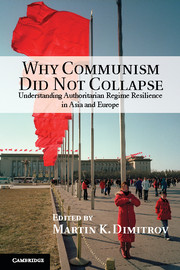Book contents
- Frontmatter
- Contents
- Tables and Figures
- List of Contributors
- Acknowledgments
- Abbreviations
- Part I Reform and Resilience
- Part II Ideology and Resilience
- Part III Contagion and Resilience
- Part IV Inclusion and Resilience
- Part V Accountability and Resilience
- 9 Vietnam through Chinese Eyes
- 10 Vertical Accountability in Communist Regimes
- 11 Conclusion
- Miscellaneous Bibliography
- General Bibliography
- Index
- References
10 - Vertical Accountability in Communist Regimes
The Role of Citizen Complaints in Bulgaria and China
Published online by Cambridge University Press: 05 August 2013
- Frontmatter
- Contents
- Tables and Figures
- List of Contributors
- Acknowledgments
- Abbreviations
- Part I Reform and Resilience
- Part II Ideology and Resilience
- Part III Contagion and Resilience
- Part IV Inclusion and Resilience
- Part V Accountability and Resilience
- 9 Vietnam through Chinese Eyes
- 10 Vertical Accountability in Communist Regimes
- 11 Conclusion
- Miscellaneous Bibliography
- General Bibliography
- Index
- References
Summary
The chapters in this volume aim to identify the institutional foundations of the resilience of communist regimes. This task is complicated by the fact that some communist regimes collapsed in 1989–1991, whereas others survived this watershed period. The contributors to the volume approach the question of collapse in different ways. Some emphasize differences by presenting theoretical arguments about the presence of certain variables in the countries that collapsed and their absence in countries that survived. For example, Bernstein (Chapter 2) discusses political liberalization in the Soviet Union and its absence in China, whereas Bunce and Wolchik (Chapter 5) and Kramer (Chapter 6) highlight the susceptibility of the Eastern Bloc to contagion and the ability of the East Asian communist regimes to avoid contagion. In a similar vein, Tismaneanu (Chapter 3) discusses ideological erosion in Eastern Europe and the reinvigoration of ideology in China and North Korea. Ideological erosion in Europe also provides the background against which Charles Armstrong (Chapter 4) discusses the essential role of ideology for the maintenance of the North Korean regime. In turn, Gallagher and Hanson (Chapter 7) argue that the absence of both carrots and sticks explains Soviet collapse, whereas the survival of communist regimes after 1989 is based on varying combinations of carrots and sticks. Other chapters take a different approach by focusing only on resilient regimes. Examples are provided by Tsai (Chapter 8), who discusses the contribution of private entrepreneurs to regime resilience in China and Vietnam, and by Abrami, Malesky, and Zheng (Chapter 9), who explore variation in the institutions of vertical and horizontal accountability in China and Vietnam. These two chapters allow us to investigate in depth the causal mechanisms that link a certain variable to the outcome of regime resilience.
This chapter presents a third approach for assessing the impact of individual variables on regime resilience. It tracks how changes in the same variable (erosion in vertical accountability) had the same short-term effect (instability due to decreasing popular loyalty) in both Bulgaria and in China prior to 1989. Despite this shared instability, one regime collapsed whereas the other survived through the use of force. This chapter therefore allows us to distinguish between regime decay and regime collapse: although both Bulgaria and China experienced decay prior to 1989, only one of the two regimes collapsed. The chapter also investigates China’s ongoing efforts to strengthen accountability after 1989, thus highlighting the contribution of institutions of accountability to regime resilience.
Information
- Type
- Chapter
- Information
- Why Communism Did Not CollapseUnderstanding Authoritarian Regime Resilience in Asia and Europe, pp. 276 - 302Publisher: Cambridge University PressPrint publication year: 2013
References
Accessibility standard: Unknown
Why this information is here
This section outlines the accessibility features of this content - including support for screen readers, full keyboard navigation and high-contrast display options. This may not be relevant for you.Accessibility Information
- 19
- Cited by
